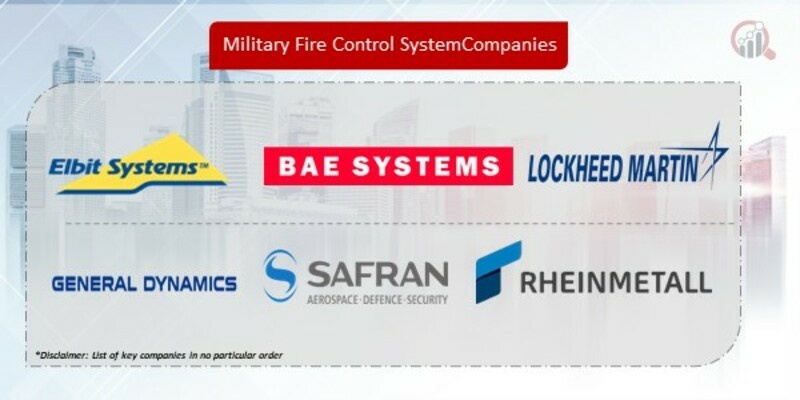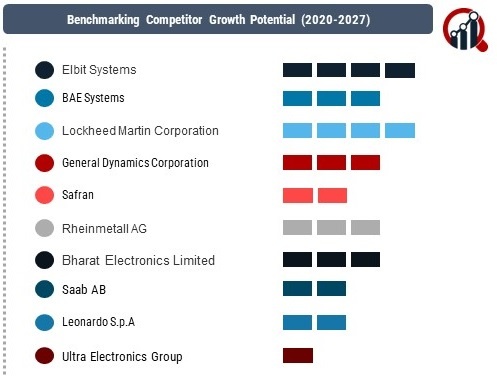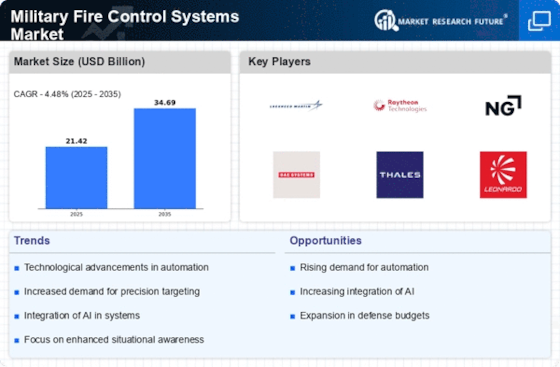Top Industry Leaders in the Military Fire Control System Market

Strategies Adopted By Key Players Military Fire Control System market
- Elbit Systems in Israel
- BAE Systems in the UK
- Lockheed Martin Corporation in the US
- General Dynamics Corporation in the US
- Safran in France
- Rheinmetall AG in germany
- Bharat Electronics Limited in India
- Saab AB in Sweden
- Leonardo S.p.An in Italy
- Ultra Electronics Group in the UK
To maintain and strengthen their positions, key players have adopted various strategies. One prevalent approach is the development of integrated solutions, combining fire control systems with other critical components like sensors and communication systems. Lockheed Martin, for instance, has focused on creating seamlessly integrated systems that enhance the overall combat capabilities of military platforms. Additionally, partnerships and collaborations with other defense contractors and technology companies have become common, facilitating the exchange of expertise and resources.
Factors for Market Share Analysis:
Several factors contribute to the analysis of market share within the Military Fire Control System market. Technological innovation and the ability to provide cutting-edge solutions play a pivotal role. Companies investing in research and development, pushing the boundaries of sensor technologies, artificial intelligence, and data processing, are more likely to secure larger market shares. Furthermore, strategic contracts with military organizations worldwide contribute significantly to market share, as demonstrated by successful collaborations between key players and defense agencies.
New and Emerging Companies:
The landscape is not static, and new entrants are continually emerging with innovative technologies. Smaller companies, such as Elbit Systems and Safran Electronics & Defense, have gained traction by focusing on niche markets and developing specialized fire control solutions. These companies often bring agility and flexibility to the market, challenging established players with their ability to adapt to rapidly evolving defense requirements. The rise of these emerging companies adds a layer of complexity to the competitive landscape.
Industry News:
Recent industry news reflects the ongoing developments within the Military Fire Control System market. Advancements in artificial intelligence and machine learning have been notable, enabling fire control systems to adapt to dynamic combat scenarios and improve decision-making processes. Additionally, international collaborations and joint ventures have been a common theme, with companies forging partnerships to address specific global defense challenges. Such collaborations often result in the exchange of technologies and expertise, influencing the competitive dynamics of the market.
Current Company Investment Trends:
Investment trends within the Military Fire Control System market are indicative of the industry's future trajectory. Companies are allocating substantial resources to research and development, with a focus on next-generation technologies. Investment in artificial intelligence, automation, and cybersecurity features prominently in these trends, reflecting the growing importance of these capabilities in modern warfare. Additionally, companies are investing in expanding their global footprint through strategic acquisitions and partnerships to secure a broader customer base.
Overall Competitive Scenario:
The overall competitive scenario in the Military Fire Control System market is marked by a delicate balance between established players, emerging companies, and technological advancements. Established players continue to dominate, leveraging their experience, extensive portfolios, and global reach. However, the landscape is evolving, with emerging companies challenging the status quo by offering specialized solutions and innovative technologies. The race to develop integrated, intelligent, and adaptive fire control systems is intensifying, driven by the increasing complexity of modern warfare scenarios.
Company News :
Lockheed Martin:
Successfully integrated and tested their Skyfire fire control system on the F-35 fighter jet, marking a significant milestone in its operational deployment.
Announced a partnership with a leading AI company to develop intelligent fire control algorithms for enhanced target recognition and decision-making in complex environments.
Rheinmetall AG:
Won a major contract from the German Bundeswehr to supply their Argus fire control system for armored vehicles, emphasizing modularity and adaptability to diverse combat scenarios.
Developed a compact and lightweight fire control system for infantry units, offering improved targeting accuracy and portability for ground troops.
BAE Systems:
Delivered upgraded fire control systems for the British Army's Warrior infantry fighting vehicles, increasing firepower and survivability on the battlefield.
Partnered with an academic institution to research advanced sensor fusion algorithms for future fire control systems, aiming to optimize data analysis and target tracking.











